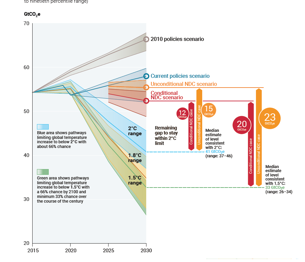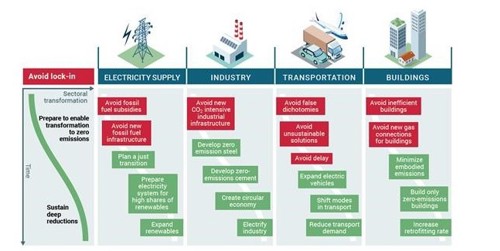An opinion piece from Robyn Lovelock
The encouraging news from COP27 is that Ambition North Wales is well-placed to deliver on recommended action for regional bodies. To deliver inclusive, sustainable growth for our region, we now need to follow through on our commitments in an inclusive way, while increasing attention on biodiversity and adaptation.
“The world is on the highway to climate hell” was the assessment of Antonio Guterres at COP27. Some years ago, I lived in Uganda, where people have been facing the reality of climate change for several decades: I saw first hand people being driven from their farms by frequent, extreme weather events.
With over 3,000 excess deaths from this summer’s heatwave and flooding now regularly devastating communities in Wales, we start to understand how extreme weather is likely to impact life in Wales: these events will increasingly undermine our manufacturing and food supply chains, damage key infrastructure, interrupt services and risk lives more frequently.
And what we’re experiencing is only 1 degree of warming. ‘Climate hell’ is anything beyond 1.5 degrees.


Global GHG emissions under different scenarios and the emissions gap in 2030.
Source: UN Environment Programme Global Emissions report 2022
Yet emissions continue to rise, likely reaching a new all-time high in 2021. Every single thing we buy – as organisations, businesses and individuals – contributes to more emissions. The chart below shows our current trajectory (the rising blue line), pathways if all government commitments (NDCs) are delivered, and the further ambition that is needed to reach a safe space for humanity at 1.5 degrees.
As a regional body delivering large scale infrastructure projects, the discussions at COP27 have direct implications for decisions being made by Ambition North Wales, its local authority and its academic partners. The diagram below summarises actions to avoid and promote. As the pathways above show, change is going to require dedicated effort at all levels - national, regional and local. It means every single decision related to energy, industry, transport and building needs to be scrutinised – and a lower carbon way forward found.
Encouragingly the North Wales Growth Deal has already made commitments in line with these recommendations. Its projects are being developed to deliver against the following targets:
- to operate at net zero
- to increase biodiversity by at least 10%
- to reduce carbon emissions caused by construction by at least 40%
These commitments were made in recognition that buildings and construction consistently contribute around 40% of total global emissions, according to the International Energy Agency. Importantly, the team have developed a promising new methodology launched in the run-up to COP27 that will help Growth Deal projects deliver on these targets.
Recommendations in the Emissions Report 2022 go further and specifically set out what regional bodies, local authorities and businesses can do to help reduce emissions across energy, industry, transport, buildings and more.
Once again, it is encouraging that Ambition North Wales is already delivering on many of the recommended actions for regional bodies, and is well-placed for further action. The full guidance is summarised at the bottom of this article, but some highlights include:
- Energy: Plan for a just fossil fuel phase out – the Growth Deal is supporting roll out of a Smart Local Energy project across the region, supporting community-owned energy; the Hydrogen Hub project will help decarbonising agriculture and industry transition to green hydrogen.
- Zero carbon industrial processes - the Growth Deal is supporting innovation, research and development in environmental biotechnology (replacing harsh chemical and fossil fuel based industrial processes with biologically derived enzymes) and lighter-weight, more efficient composites materials. Research centres aim to operate at net zero and reduce embodied carbon emissions, while also improving biodiversity.
- Buildings: implement zero emissions buildings: all projects delivered by the Growth Deal will aim for net zero emissions and 40% reduced embodied carbon.
But targets are not enough: we need to deliver on them so that the region can benefit from the skills and jobs boost from a proactive shift to a low carbon economy. And the rewards are substantial if we do, with estimates of an £11bn Revenue Boost to the Welsh Economy if we Hit Net Zero Targets.
So while we must enjoy the progress we’re making – we must recognise more work is to be done to deliver the well-being for Future Generations recognised in our ground-breaking government Act and not rely on our children to clear up mess that we make now:
- A Resilient North Wales: We must increase action tackling the ecological crisis that risks undermining our economy and food security in the region.
- A Prosperous North Wales: We must ensure all infrastructure commissioned is fit for the future – that it can withstand greater extremes of heat and cold, and is designed to avoid or handle regular flooding from rising seas or flooded rivers. Around 1023, King Canute failed to turn back the rising tide; lets avoid repeating the same lesson 1,000 years later.
- A more equal North Wales: In doing all the above, we must ensure we focus on a just transition for those communities most vulnerable in our region, geographically, socially and economically.
These are significant challenges, against challenging economic headwinds, further reinforcing the message that every decision must count across all these priorities. I hope Ambition North Wales colleagues, local authority and business leaders feel encouraged by our efforts to lead action in this critical area, and that they look now at ways to consolidate our achievements and move forward confidently towards a sustainable and resilient future for our region.

About the author: Robyn Lovelock is a programme manager for Ambition North Wales, leading on realising benefits from the over £1 billion Growth Deal investment into North Wales. A graduate in Geography and Politics from Aberystwyth University and with an MBA from Warwick University School of Business, she has spent more than 20 years delivering sustainable development projects around the world and in Wales. She lives in Llangollen with her husband and two young children.
~
Photo by NOAA